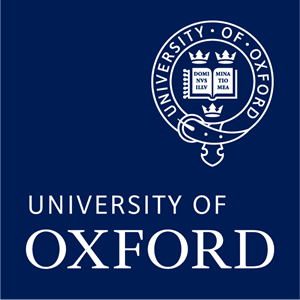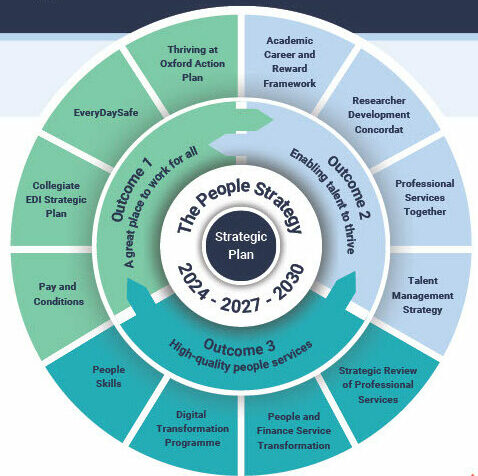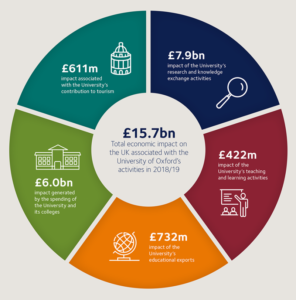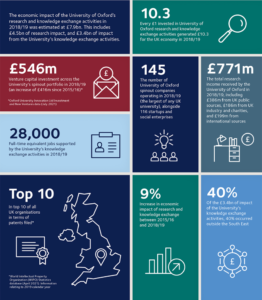

University of Oxford
Are you a passionate leader with a vision for transformative learning and development in higher education?
The University of Oxford is seeking a Head of Learning and Organisational Development to lead its Learning and Organisational Development. This pivotal role will contribute to delivering the Strategic Plan and People Strategy and ensure that the educational offerings align with the institution’s goals.
You will be required to lead the strategic planning and implementation of comprehensive learning and development programmes that support the University’s mission. Collaborating with senior stakeholders across the University to enhance leadership and management capabilities, will be critical to the success of this role.
You will be responsible for the design, implementation, and evaluation of innovative learning initiatives, including workshops, seminars, and online courses. You will also be adept at utilising assessment tools to measure programme effectiveness and drive continuous improvement.
You will bring demonstrable experience in developing and executing Employee Engagement initiatives in partnership with key departmental stakeholders. You will also oversee the implementation of a leading Learning Management System to meet the University’s objectives, ensuring the delivery of responsive, high-quality professional learning solutions tailored to prioritised organisational development initiatives.
We are looking for a dynamic individual with substantial experience in learning and organisational development within a large and complex setting. While higher education experience is not required, relevant transferable skills and an understanding of the complexities of an academic environment would be beneficial.
We are deeply committed to fostering an inclusive and diverse learning environment, and your expertise will help us build a thriving educational community. Together, we can ensure that our initiatives not only meet the needs of our staff but also enrich the entire educational experience.
About the University of Oxford
Welcome to the University of Oxford. We aim to lead the world in research and education for the benefit of society both in the UK and globally. Oxford’s researchers engage with academic, commercial and cultural partners across the world to stimulate high-quality research and enable innovation through a broad range of social, policy and economic impacts.
We believe our strengths lie both in empowering individuals and teams to address fundamental questions of global significance, while providing all our staff with a welcoming and inclusive workplace that enables everyone to develop and do their best work. Recognising that diversity is our strength, vital for innovation and creativity, we aspire to build a truly diverse community which values and respects every individual’s unique contribution.
While we have long traditions of scholarship, we are also forward-looking, creative and cutting-edge. Oxford is one of Europe’s most entrepreneurial universities. Income from external research contracts in 2016/17 exceeded £564m and we rank first in the UK for university spin-outs, with more than 130 companies created to date. We are also recognised as leaders in support for social enterprise.
Join us and you will find a unique, democratic and international community, a great range of staff benefits and access to a vibrant array of cultural activities in the beautiful city of Oxford.
For more information, please click here.
Oxford is a world-leading centre of learning, teaching and research and the oldest university in the English-speaking world and can lay claim to nine centuries of continuous existence.
Academic divisions
There are four academic divisions within Oxford University. All have a full-time divisional head and an elected divisional board. Also listed are the University Administration Services (UAS), where this role sits, the Department for Continuing Education, and the University’s Gardens, Libraries and Museums.
Our People Strategy 2024-2027
The strategy outlines how the University invests in its people.
The People Strategy is pivotal to the University’s mission and a foundational pillar of the Strategic Plan 2025 – 2030.
To achieve our goal of investing in our people, the People Strategy targets three outcomes, which we are working towards over the next three academic years; 2024 – 2027. The first two outcomes are mutually supportive. Through creating a great place to work for all, we will attract the best talent to come to Oxford. They stay and build their careers with us because we are a University that enables talent to thrive. To support these aims, we will continue to build high-quality people services tailored to the University’s needs.
Together, these outcomes are the shared standard against which we will measure the success of our HR and people initiatives across the University, its divisions and departments. Learn about how we will achieve this and how you can participate here.

A study carried out by London Economics – The Economic Impact of the University of Oxford – measured the University’s impact on the UK economy in 2018/19. It considers the impact of a range of University activities, including:
The report found that every £1 invested in University of Oxford research and knowledge exchange activities generated £10.30 to the wider UK economy.
The total impact in regions outside the South East was over £4 billion (38%), with impacts in excess of £100 million occurring in each region outside of the South East.
Oxford’s economic impact

Impact of research, intellectual property, University spinouts, and science parks

University of Oxford’s Equality Policy
The University of Oxford is committed to fostering an inclusive culture which promotes equality, values diversity and maintains a working, learning and social environment in which the rights and dignity of all its staff and students are respected. We recognise that the broad range of experiences that a diverse staff and student body brings strengthens our research and enhances our teaching, and that in order for Oxford to remain a world-leading institution we must continue to provide a diverse, inclusive, fair and open environment that allows everyone to grow and flourish.
The University embraces diversity amongst its members and seeks to achieve equity in the experience, progression and achievement of all students and staff through the implementation of transparent policies, practices and procedures and the provision of effective support. It also seeks to ensure that its public engagement work and services benefit diverse audiences and communities.
The University recognises that equality and inclusion should be embedded in all its activities and seeks to promote awareness of equality and foster good practice. The University is committed to a programme of action to support its equality policy, to monitoring its effectiveness, and to publishing information on progress towards its equality aims.
The University seeks to ensure that no member of its community is unlawfully discriminated against on the basis of age, disability, gender reassignment, marital or civil partnership status1, pregnancy and maternity, race (including colour, nationality and ethnic or national origins), religion or belief (including lack of belief), sex, or sexual orientation (hereafter referred to as the ‘protected characteristics’).
In exercising its policies, practices, procedures and other functions, the University will have due regard to its duties under the Equality Act 2010 and to the protected characteristics, as well as other relevant circumstances including parental or caring responsibilities, contract type, and working hours.
The University will seek to make a positive contribution to the advancement of equality through all its activities. In particular, the University will:
Encourage applications for study and employment from the widest pool of potential candidates, especially where representation is disproportionately low, and take lawful positive action, for example with targeted scholarships, to improve diversity where appropriate.
Take appropriate steps to meet the particular needs of individuals from protected groups where these are different from the needs of others, and work to eliminate any barriers to their success.
In respect of students, seek to attract and admit students of outstanding potential whatever their background, and work to ensure that teaching and assessment provide an equal opportunity for all students to achieve and demonstrate their full academic potential. Decisions on the admission of students will be based solely on the individual merits of each candidate and the application of selection criteria appropriate to the course of study.
In respect of staff, seek to ensure that entry into employment and progression within employment are determined solely by criteria which are related to the duties of a particular post and the relevant grade; and support career development and progression with the aim of ensuring diverse representation and participation at all levels.
The University understands inclusion to mean institutional and individual efforts and actions to foster an environment and institutional culture in which each member feels, and is, valued, listened to and respected, able to be themselves and empowered to participate fully in the life of the University.
The University expects all members of the University community to treat each other with respect, courtesy and consideration and does not tolerate any form of unlawful discrimination, bullying, harassment or victimisation. It has a Policy on Harassment, which includes examples of unacceptable behaviour, supported by a Harassment Advisory Service.
Freedom of expression and academic freedom, as outlined in the University’s Statement on Freedom of Speech, are protected by law, and by the University’s statutes and policies, though these rights must be exercised within the law.
Learn more about the policy here.
UNIVERSITY BENEFITS
University employees enjoy 38 days’ paid holiday (inclusive of bank holidays and fixed closure days), generous pension schemes, travel discounts, and a variety of professional development opportunities. Our range of other employee benefits and discounts also includes free entry to the Botanic Gardens and University colleges, and discounts at University museums. Learn more here.
University Club and sports facilities
Membership of the University Club is free for all University staff. The University Club offers social, sporting, and hospitality facilities. Staff can also use the University Sports Centre on Iffley Road at discounted rates, including a fitness centre, powerlifting room, and swimming pool. Learn more here and here.
Information for staff new to Oxford
If you are relocating to Oxfordshire from overseas or elsewhere in the UK, the University’s Welcome Service website includes practical information about settling in the area, including advice on relocation, accommodation, and local schools. Click here.
The University of Oxford Newcomers’ Club
The University of Oxford Newcomers’ Club is an organisation run by volunteers that aims to assist the partners of new staff to settle into Oxford and to provide them with an opportunity to meet people and make connections in the local area. Learn more here.
Childcare
The University has excellent childcare services with five University nurseries, as well as University-supported places at many other private nurseries. For full details, including how to apply and the costs, click here.
Family-friendly benefits
With one of the most generous family leave schemes in the Higher Education sector, and a range of flexible working options, Oxford aims to be a family-friendly employer. We also subscribe to My Family Care, a service that provides practical advice and support for employees who have caring responsibilities. The service offers a free telephone advice line, and the ability to book emergency back-up care for children, adult dependents and elderly relatives. Learn more here.
Disabled staff
We are committed to supporting members of staff with disabilities or long-term health conditions. For further details, including information about how to make contact, in confidence, with the University’s Staff Disability Advisor, see here.
Staff networks
The University has a number of staff networks including the Oxford Research Staff Society, BME staff network, LGBT+ staff network and a disabled staff network. You can find more information here.
USS Pensions Hub
The Universities Superannuation Scheme (USS) – a national pension scheme open to staff in academic or comparable posts in a number of universities. Learn more here.
Other benefits
Staff can enjoy a range of other benefits such as free visitor access to the University’s colleges and the Botanic Gardens as well as a range of discounts. Learn more here.
IMPORTANT INFORMATION FOR CANDIDATES
Pre-employment screening
All offers of employment are made subject to standard pre-employment screening, as applicable to the post.
If you are offered the post, you will be asked to provide proof of your right-to-work, your identity, and we will contact the referees you have nominated. You will also be asked to complete a health declaration (so that you can tell us about any health conditions or disabilities so that we can discuss appropriate adjustments with you), and a declaration of any unspent criminal convictions.
We advise all applicants to read the candidate notes on the University’s pre-employment screening procedures, found here.
The University’s policy on retirement
The University operates an Employer Justified Retirement Age (EJRA) for all academic posts and some academic-related posts. The University has adopted an EJRA of 30 September before the 69th birthday for all academic and academic-related staff in posts at grade 8 and above. The justification for this is explained here.
For existing employees, any employment beyond the retirement age is subject to approval through the procedures, learn more here.
There is no normal or fixed age at which staff in posts at grades 1–7 have to retire. Staff at these grades may elect to retire in accordance with the rules of the applicable pension scheme, as may be amended from time to time.
Equality of Opportunity
Entry into employment with the University and progression within employment will be determined only by personal merit and the application of criteria which are related to the duties of each particular post and the relevant salary structure. In all cases, ability to perform the job will be the primary consideration. No applicant or member of staff shall be discriminated against because of age, disability, gender reassignment, marriage or civil partnership, pregnancy or maternity, race, religion or belief, sex, or sexual orientation.
Data Privacy
Please note that any personal data submitted to the University as part of the job application process will be processed in accordance with the GDPR and related UK data protection legislation. For further information, please see the University’s Privacy Notice for Job Applicants here. The University’s Policy on Data Protection is available here.
Anderson Quigley is acting as an advisor to the University; an executive search process is being carried out by Anderson Quigley in addition to the public advertisement.
The closing date for applications is noon on 3 April 2025.
Applications should consist of:
Should you wish to discuss the role in strict confidence, please contact Alicja Janowska on alicja.janowska@andersonquigley.com or +44 (0)7743 927 783 or Kiersten Avery on kiersten.avery@andersonquigley.com or +44 (0)7510 384 735.